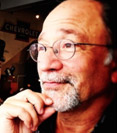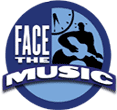CONNECTING THE DOTS

I remember, as a small child, playing a game called "Connect the Dots."
In front of me was an activities book composed of sheets of paper with nothing on them but numbered dots. My task was a simple one -- to draw lines between the dots, connecting each dot sequentially. #1 would get connected to #2. #2 would get connected to #3 and so on until each of the dots were connected, resulting in the creation of some kind of picture -- a hat, a house, a boat, or whatever the book publisher had in mind.
I found this fascinating, thrilled that I could make something, that out of nothing something would emerge -- something I could recognize, name, and later, talk about.
And while I did not grow up to become an artist, I did develop an interest in the phenomenon of pattern recognition, pattern making, and the various ways in which human beings construct their own reality.
As I got older, it became clear to me that this same children's game of connecting the dots had played itself out, in human history, in many fascinating ways. What were the constellations, if not bigger kids -- the ancient Greeks and Babylonians -- connecting non-numbered dots in the night sky -- the product of their need to make sense out of what they saw.

And so Orion, Canis Major, the Big Dipper, and 84 other configurations of stars came into being -- points of light that were clustered and named by the earth's first farmers as a way to help them figure out when to plant and when to harvest.
And to help them remember the constellations they had configured, the farmers made up myths -- wild stories to remind them of the patterns in the sky so they could pass on what they had discovered to next generation.
But it wasn't only farmers who benefited from this connect-the-dots myth-making phenomenon. Ancient sailors did, too, adventurers whose long journeys across unchartered waters were navigated by watching man-made constellations in the skies to mark their position.
This is what human beings do. We connect the dots. We make patterns. And then we translate what we see into stories as a way to remember and communicate to others what we have conjured.
That's what stories are. First there is a point -- an isolated moment in time and space when something becomes perceivable -- a leaf falling, perhaps, a dog barking, a thief, a speck of light.
In and of itself, this perceptible thing is just an isolated dot. In the first instant when it becomes known to the observer, it is freestanding, independent, and unrelated to anything else in the universe. It is not connected to the past or the future. It is not the beginning of something or the end of something. There is no plot, no unfolding of events, no Act One, Scene Two. No nothing.
It just is.
But soon the story-making part of ourselves kicks in -- the constellation maker.
Ruled by a primal need for meaning and knowing, it begins to connect the dots, to make sense of what it sees. It draws invisible lines through time and space until it sees a picture in its mind, a recognizable shape that helps make sense of experience.
Standing beneath the infinite sky of possibilities, this innate pattern-making tendency brings orientation, comfort, and a newfound ability to communicate our subjective experience to others.
Some become movies. Some become books. Some become jokes. Some are told around the kitchen table or never at all.
Perhaps the most dramatic example of this is the phenomenon of creation myths -- the symbolic narratives of how the world began and how people first came to inhabit it. Every culture has their own -- elaborate cosmological stories with plots, sub-plots, characters, settings, obstacles and, more often than not, a whole bunch of deities.
Deconstruct any scripture or holy book and you will discover that its DNA is story -- parables, allegories, and tales that have become the human shorthand for delivering meaningful, memorable messages upon which we base our lives.
Now, here's where it gets really interesting. When the dots are numbered, and we proceed to connect them in the same, sequential progression, we always arrive at the same picture -- conclusions that everyone can agree on.
But when the dots are not numbered and the dot connectors (that's us, folks) realize we have a choice about how we connect the dots and whether to make the lines wiggly, wavy, bold, invisible, or straight, a very different picture emerges and a very different story gets told.
The simplest example of this is a husband and wife arguing.
While the same dots may be marked on the paper (or in the sky), the way in which the husband and wife connect the dots is very different, resulting in two very different and, often, conflicting stories. He sees it one way. She sees it the other. The result? The plot of many a modern day sitcom and a 50% divorce rate.
This phenomenon plays out on many other stages, as well. The Israelis, for example, connect the dots differently than the Palestinians. Virgos connect the dots differently than Leos. And the Native Americans connect the dots differently than America's Founding Fathers.
Psychologists attribute our dot connecting behavior to a cognitive principle they have reduced to three words: Motivation affects perception.
In other words, we see, they say, what we are primed to see, filtered through our need or desire of the moment -- a phenomenon which Eastern pundits have translated in their own, more metaphorical way, "When a pickpocket meets a saint, all he sees are pockets."
Done well, storytelling is a force for good, an extraordinary way to energize, inspire, and transmit wisdom. Abused, storytelling has an entirely different result.
Con artists, for example, tell believable stories, but only with the intention to deceive. The same holds true for corrupt politicians, spin doctors, cheating spouses, warmongers, the sensationalist media, gossipers, most of the advertising world, and anyone else attempting to bend the truth for their own personal gain.
The fact that human beings are story-making machines is undebatable. From the first Paleolithic cave paintings to the latest Hollywood blockbuster, that's what we do.
What's up for grabs is this: the kind of stories we choose to tell.
Storytelling for the Revolution
MitchDitkoff.com
Child on ladder photo: Samuel Zeller
Night sky photo; Clint McKoy
Posted by Mitch Ditkoff at 05:41 PM | Comments (1)
November 10, 2023The Hostage Situation
A few days ago, Rabbi Zoe B. Zak from Temple Israel of Catskill asked me to write something for tonight's Sabbath service -- something that spoke to the hostage situation in Israel.
This gave me pause and one more opportunity to reflect -- specifically on what, if anything of value, did I have to say about this great tragedy and from what persona of mine would I speak?
As a member of this temple? A Jew? An American? A man? A father? A poet? A Democrat? A peace advocate? A lifelong seeker of truth?
There are so many ways to look at things, so many points of view, so many sides of the story.
At first blush, like all of you here tonight, my heart goes out to the hostages and their families. I can only imagine if it were my children who had been taken hostage... or my friends... or my parents. I have no words to describe the feelings I would be having, never having lived through this nightmare myself.
Nor do I have words to describe the feelings of the hostage-takers and what drove them to such an action in the first place.
Here's what I know: thoughts and prayers are not enough to heal the pain that the people of Israel and Palestine are experiencing. Nor is political posturing, protest marches and whatever cease fire or truce is eventually agreed on -- especially since we all know that whatever cease fire or truce is agreed on will only be temporary and that the deep-seated hatred and antagonism that both sides have for each other -- along with their own "proof" for why their stance is well-founded -- is likely to continue.
Here's what else I know:
We were not born to hurt, fight and kill each other. We were born to experience love, kindness, compassion, consciousness and true humanity.
Demonizing the so-called "other" is easy to do. It has become a sport on planet earth -- which, as far as I can tell, is a planet of duality, one of the great challenges facing all of us -- the apparent dance of opposites:
Up and down... in and out... black and white... good and bad... East and West... North and South... hot and cold... male and female... light and dark... now and later... hard and soft... you and me... us and them... Israel and Palestine.
This duality, deeply embedded into the DNA of every single person that walks this earth very much affects our perceptions of life. "Otherness" rules us in just about every aspect of our lives. And this otherness blinds us to our common humanity in such a vile way that it makes it insanely difficult to experience each other as brothers and sisters... or children of the same God.
We have all been taken hostage by this mindset of otherness. We have all been kidnapped by an invisible force that makes it extremely difficult to come from a place of love instead of hate, compassion instead of destruction, kindness instead of killing.
Personally speaking, I have seen and felt a lot in my 76 years.
I almost died at 21, just three seconds away from drowning. Three years later, when I was 24, I met a great being and experienced my timelesss, true nature beyond the circumstances of my life. I saw an angel when I was 27 -- not in my imagination, but in my room. I worked in an Islamic school for a year -- the only Jew among 1,000 Muslims. I have walked the halls of power in corporate America, for 35 years, invited by that curious slice of humanity to open their minds to new possibilities. I have brought two children into this world, written seven books, and watched Fiddler on the Roof six times.
Speaking of which, there is a scene in that movie that has always stayed with me -- one that has relevance to the world we now find ourselves living in. Perhaps you remember the scene.
Tevye, the town milkman and also the town wise man was walking through the town square when he encounters two villagers arguing loudly about a transaction they recently had. Apparently, one of the men sold a horse to the other, but the other man is now insisting it was not a horse, at all, but a mule. When they see Tevye, each of them turns to him and vehemently makes their case.
After the first man tells his side of the story, Tevye strokes his beard and says "You're right!"
Then the second man, with an entirely different story of the transaction, makes his case to Tevye.
Tevye listens, strokes his beard and says. "You're right!"
A third villager, standing close by, who had been watching the argument play out for the past ten minutes then turns to Tevye and says, "Wait a minute, how can he be right (pointing to the first man) AND he be right (pointing to the second man)?"
Tevye listens, strokes his beard, and exclaims "YOU'RE RIGHT!" Then he starts dancing, embodying in that highly-charged moment, something far beyond right and wrong.
This story may sound cute to you or not at all applicable to the awful situation in the Middle East. But it is neither cute or naive. There is a lot of truth in it.
Until and unless, we -- as a species -- get to a place beyond our cultural perceptions of right and wrong -- we will always be fighting, always killing, always taking others hostage and more fundamentally, taking ourselves hostage.
What I am talking about has nothing to do with the laws of mankind. It has to do with the laws of life and the almighty -- that which not everyone agrees on, selectively quoting from their favorite scripture or interpretation of their favorite scripture to support their own point of view.
What can YOU do in regard to the hostage situation in Israel? What can you do in regard to the horror show going on in the Middle East these days -- and let us not forget the war between Russian and Ukraine.
That is for you to decide.
You can send thought and prayers. You can send money. You can send ambassadors. You can protest. You can write letters. You can come to services like the one here tonight. And all of these approaches, of course, have their place and time.
But ultimately, all of us -- you and me and everyone else who is not in this room tonight -- will need to find our own way back to peace -- the promised land that is not a physical place, but a state of being, a state of consciousness -- one whose natural attributes are love, kindness, empathy, compassion, selflessness, and the recognition that all people, regardless of their apparent differences, skin color, religion, language, politics, education, or perceptions are children of the same God -- all here to experience true love and forgiveness.
For now, before I take my leave, I invite you to close your eyes, take a long slow breath, and get in touch with one step you can take, one move you can make, to bring more love, kindness and understanding into this world -- starting tonight, in this room right now, in your home when you return there, and tomorrow in your community or wherever you can reach out to someone with love in your heart and the timeless recognition that we are all in this together.
Shalom! As-salamu alaikum to you all!
MitchDitkoff.com
Unspoken Word
My peace poetry Facebook group
Posted by Mitch Ditkoff at 09:21 AM | Comments (0)













